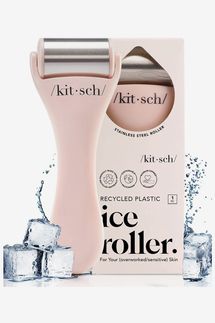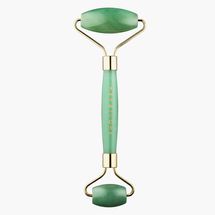
Has TikTok Influenced You Into Thinking You Have This? Us Too.
Is “cortisol face” for real? I keep seeing people on socials saying that when they’re stressed, they look super round and puffy, but isn’t it just that they’re tired or in a mood or something? How bad is cortisol for your skin really? —Tara
Have you noticed that the myths most likely to gain traction online — like the idea that stress makes your face rounder, and that the cause is increased cortisol levels — are the ones that have a grain of truth at their heart? I think that’s what’s going on here. Because it’s true that stress can affect your skin negatively, and it’s also true that in very rare cases, chronically high levels of cortisol can lead to the accumulation of facial fat, but that doesn’t mean that more stress equals a rounder face. Let me explain.
Can cortisol make your face puffy?
Yes, but it is rare. There’s an uncommon endocrine disorder called Cushing syndrome that, in some patients, can lead to the accumulation of facial fat and a symptom called “moon face,” explains dermatologist Brendan Camp, MD. But, he adds, “in Cushing’s Syndrome, there’s prolonged, sustained exposure to cortisol as opposed to intermittent, temporary spikes,” which is what most people experience when they’re stressed out. In fact, even if someone is chronically stressed, they will not experience the high levels of cortisol seen in patients with Cushing syndrome.
So what actually causes a puffy face?
If someone doesn’t have an underlying medical condition (and isn’t experiencing an allergic reaction), Camp says their facial swelling is more likely due to fluid retention or inflammation. But I can see why so many people connect these symptoms to stress!
Consider this scenario: Someone is feeling stressed, so they’re not sleeping well and they don’t have the time or energy to cook, which means they’re eating more takeout. After a few days, they may notice their face is looking puffy. They may blame cortisol, but the more likely reason their face has changed is that the lack of sleep and increased salt in their diet led to a bloated appearance. And if the changes to their face happen over a longer period of time, it’s possible there are other causes at play, like weight loss or gain or natural facial changes from aging.
How do I get rid of a puffy face — even if it’s not caused by cortisol?
If changes to someone’s face shape are due to temporary puffiness, there are some quick fixes that will help. First up, reduce your sodium intake, says Camp. He also suggests sleeping with your head slightly elevated on an extra pillow, which helps to prevent fluid accumulation. (If you have trouble sleeping on your back, try putting another pillow beneath your knees so it’s harder to roll onto your side or stomach.) Finally, he suggests using a cold compress or a cold roller “to help improve lymphatic drainage.”
If you want to go the roller route, I like the Kitsch Ice Roller for Face. The head has a large surface area, and it’s made of stainless steel, which seems to stay cold longer than some of the jade and jade-esque rollers I’ve tried. But my favorite way to depuff is actually Charlotte Tilbury’s ridiculous-looking reusable cryotherapy face mask (it’s currently on sale at Walmart.com for $25). You chill it in the freezer or fridge and then just strap it on to your face and relax. It has strategically placed beads that exert gentle cold pressure on your forehead and under your eyes (FYI: It also feels great if you have a headache or migraine.)
In the end, does the trending hashtag #cortisolface deserve an eye roll? Probably. But that doesn’t negate the very real impact stress has on skin. For example, research shows that stress is associated with acne flare-ups, it can slow wound healing, and it may even lead to premature skin aging. So, whatever you do to decrease stress is likely going to benefit your skin in some way—even if it’s not as simple as it seems on social media.
Send your questions to AskABeautyEditor@nymag.com. (By emailing, you agree to the terms here.)
More Beauty Advice
- Is It Pointless to Apply Skin Care on an Airplane?
- I Wear Sunscreen, and Now My Face Is Lighter Than the Rest of Me. Help!







